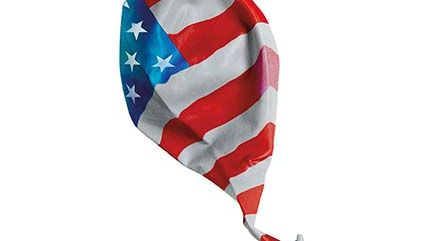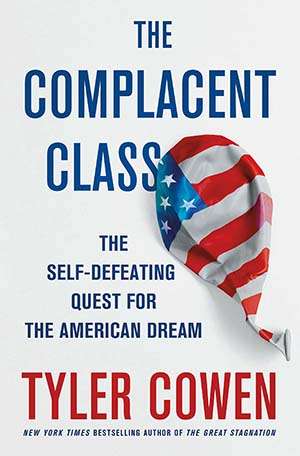The Complacent Class


Everybody's favorite libertarian economist and blogger, Tyler Cowen, is back with his signature mix of despair and optimism, following up on The Great Stagnation and Average Is Over. His latest book, The Complacent Class: The Self-Defeating Quest for the American Dream (St. Martin's Press), tells the story of various American subtypes of the rich ("the privileged"), poor ("those who are stuck"), and middle class ("those who dig in"). These classes, Cowen says, have historically contained larger shares of big-thinking go-getters, but they are increasingly reconciled to the status quo.
We don't lack in innovation, reports the Marginal Revolution founder, but our innovators are more likely to pursue comfort and convenience than to look for ways to revolutionize the world. Ironically, our politicians, entrepreneurs, and pundits are more prone than ever to use overheated rhetoric about Manhattan Projects and moonshots. Think of everything from apps that promise to "change the way you do business" to Joe Biden's hastily conceived mandate to cure cancer in the final year of Barack Obama's second term.
Cowen suggests the way out is some kind of large-scale, messy political or social upheaval. Maybe Trump's election is just what the doctor of economics ordered.
This article originally appeared in print under the headline "The Complacent Class."
Editor's Note: As of February 29, 2024, commenting privileges on reason.com posts are limited to Reason Plus subscribers. Past commenters are grandfathered in for a temporary period. Subscribe here to preserve your ability to comment. Your Reason Plus subscription also gives you an ad-free version of reason.com, along with full access to the digital edition and archives of Reason magazine. We request that comments be civil and on-topic. We do not moderate or assume any responsibility for comments, which are owned by the readers who post them. Comments do not represent the views of reason.com or Reason Foundation. We reserve the right to delete any comment and ban commenters for any reason at any time. Comments may only be edited within 5 minutes of posting. Report abuses.
Please to post comments


Question: Does this mean that we believe that the human ability to innovate is in fact infinite? It necessity is the mother of invention, but American's have most of what we want or need, that would mean...
"IF necessity is the mother of invention, but American's have most of what we want or need, that would mean..."
An alternative is that 100 or 200 years ago, the only innoovations possible were the big ones -- steam locomotives and ships are a big leap, ditto for telegraph, electrical power distribution, telephone, radio. Sure there were refinements, lots of them, but there were so few base categories existing that new ones were easy to find.
Nowadays there are a zillion base categories. Things like CRISPR, GMO crops, better batteries ... these would have been YUGE innovations 100 or 200 years ago. Now they are just mere refinements to the zillion existing areas.
And if a lot of innovation seems related to comfort and convenience, did not railroads and telephones lead to more of both? Are there not a zillion actual improvements in life related to mobile phones, and if angry birds gave millions of popele reason to buy a phone, that helped make the process cheaper so otehr, poorer, people around the world could buy phones for drastic improvements in their quality of life.